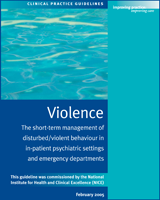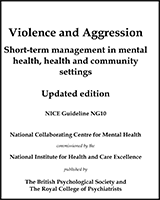All rights reserved. No part of this publication may be reproduced, stored in a retrieval system, or transmitted in any form or by any means electronic,mechanical, photocopying, recording or otherwise,without prior permission of the Publishers or a licence permitting restricted copying issued by the Copyright Licensing Agency, 90 Tottenham Court Road, London W1T 4LP. This publication may not be lent, resold, hired out or otherwise disposed of by ways of trade in any form of binding or cover other than that in which it is published,without the prior consent of the Publishers.
NCBI Bookshelf. A service of the National Library of Medicine, National Institutes of Health.
National Collaborating Centre for Nursing and Supportive Care (UK). Violence: The Short-Term Management of Disturbed/Violent Behaviour in In-Patient Psychiatric Settings and Emergency Departments. London: Royal College of Nursing (UK); 2005 Feb. (NICE Clinical Guidelines, No. 25.)
This publication is provided for historical reference only and the information may be out of date.

Violence: The Short-Term Management of Disturbed/Violent Behaviour in In-Patient Psychiatric Settings and Emergency Departments.
Show detailsThe following research recommendations have been identified for this NICE guideline, not as the most important research recommendations, but as those that are most representative of the full range of recommendations. All of the recommendations for research should consider the importance of including study-level variables relating to gender, ethnicity and those with special concerns. These research recommendations have been drawn up by GDG consensus. Further clarification has been added by the NICE technical advisor.
Prospective cohort studies are required to identify antecedents of disturbed/violent behaviour in adult psychiatric in-patient settings.
Before and after studies, surveys, cross-sectional studies and cohort studies should be undertaken to establish the following, in relation to the deliberate application of pain in physical interventions used for the short-term management of disturbed/violent behaviour in adult psychiatric in-patient settings, and in accident and emergency settings:
- ethical and legal and safety aspects
- role within range of physical interventions taught to staff
- staff and service user perceptions.
Before and after studies, surveys, cross-sectional studies and cohort studies should be undertaken to investigate the following aspects of mechanical restraints for the short-term management of disturbed/violent behaviour in adult psychiatric in-patient settings, and in accident and emergency settings:
- ethical and legal and safety aspects
- role within range of physical interventions taught to staff
- staff and service user perceptions.
Qualitative and survey research is needed to examine service users' – including black and minority ethnic groups' – views on the antecedents and risk factors of disturbed/violent behaviour, and the use of observation, de-escalation techniques, physical interventions and seclusion for the short-term management of disturbed/violent behaviour in adult psychiatric in-patient settings and in accident and emergency settings.
Clinical trials and longitudinal cohort studies should be conducted in large, well-designed randomised controlled studies with adult psychiatric in-patients (including black and minority ethnic groups) that compare the utility, acceptability, safety and desirable endpoints of available medicines and their dosages for rapid tranquillisation and PRN regimes (including atypical and antipsychotics), and assess the long-term side effects.
Controlled before and after studies are needed to evaluate the major training programmes identified by the National Institute for Mental Health in England (NIMHE) and the Counter Fraud and Security Management Service (SMS). These studies must assess the short-term and long-term effectiveness of the training programme in psychiatric inpatient settings and assess the safety of the techniques used in these training packages for both staff and service users.
Prospective cohort studies are needed to develop valid and reliable prediction tools for use in psychiatric in-patient settings appropriate for use in the UK that:
- may predict the imminent onset of disturbed/violent behaviour
- confirm the predictive validity of key risk factors and assist clinical judgement in risk prediction.
Controlled before and after studies that examine whether observation and/or de-escalation techniques minimise the need for seclusion, restraint or rapid tranquillisation are needed.
National audit data collections are required on the incidence of sudden death among psychiatric service users (including ethnicity, age, and gender) receiving rapid tranquillisation and on death/morbidity associated with restraint and seclusion.
Prospective cohort studies, before and after studies and qualitive research is needed to develop restraint techniques, which allow communication between deaf service user and deaf and visually impaired service users and staff, as well as other physically impaired service users, while also ensuring staff and service user safety.
- Recommendations for research - ViolenceRecommendations for research - Violence
Your browsing activity is empty.
Activity recording is turned off.
See more...
